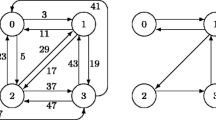Abstract.
A Stochastic Turing machine (STM) is a Turing machine that can perform nondeterministic and probabilistic moves and alternate between both types. Such devices are also called games against nature, Arthur-Merlin-games, or interactive proof systems with public coins. We investigate stochastic machines with space resources between constant and logarithmic size, and, in addition, constant or sublinear bounds on the number of alternations between nondeterministic and probabilistic moves. Lower space bounds are shown for a specific family of languages by exploiting combinatorial properties. These results imply an infinite hierarchy with respect to the number of alternations of STMs, and nonclosure properties of certain classes.
Similar content being viewed by others
Author information
Authors and Affiliations
Additional information
Received: October 25, 1997.
Rights and permissions
About this article
Cite this article
Liskiewicz, M., Reischuk, R. On small space complexity classes of stochastic Turing machines and Arthur-Merlin-games. Comput. complex. 8, 273–307 (1999). https://doi.org/10.1007/s000370050031
Issue Date:
DOI: https://doi.org/10.1007/s000370050031




